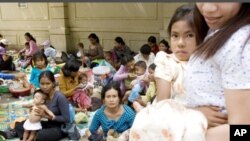Cambodia has reduced the number of maternal deaths, meeting a 2015 goal early, health officials told VOA Khmer.
“This is because the government has a clear and proper policy on health that responds to the needs of our people,” Health Minister Mam Bunheng said in an on-camera interview in Washington Thursday.
Mam Bunheng said the government has an initiative to speed up the reduction of maternal mortality by encouraging women to deliver their babies at health centers with skilled practitioners, urging traditional midwives to refer pregnant women to hospitals, and giving a $15 incentive to midwives for safe delivery.
“Referral of a pregnant woman to the hospital by a traditional midwife is very important,” said Chan Theary, executive director of the Reproductive and Child Health Alliance. “Traditionally, they help deliver the baby at home, but right now the health ministry has encouraged them not to do so.”
The government had set a goal of 250 deaths per 100,000 for the UN Millennium Development Goal. It has already reached 206, Mam Bunheng said. The government hopes to build on its success.
“Based on scientific trends, in reality we will see the rate decrease further,” he said. “We’ve used a combination of putting our strategy in operation to speed up the reduction of maternal mortality. There has also been active participation from our people and the national and international community.”
A large gap remains between urban and rural populations, though, with a mortality rate among 100,000 of 124 in the cities and 288 in the countryside, where the majority of the population lives, Mam Bunheng said.
And infant mortality remains high, Chan Theary said. “There is still a problem with malnutrition. We will have to look at these issues and study them to put in place a strategy to improve this.”
Mam Bunheng said he is now working to restore the faith of the public in its health care. “There are significant changes,” he said. “Right now our service is being used by the majority of our people.”




